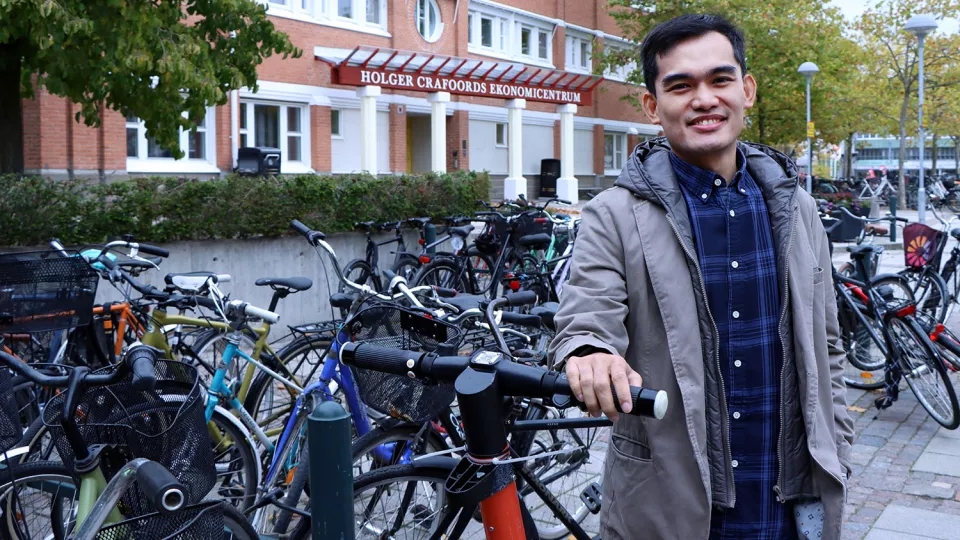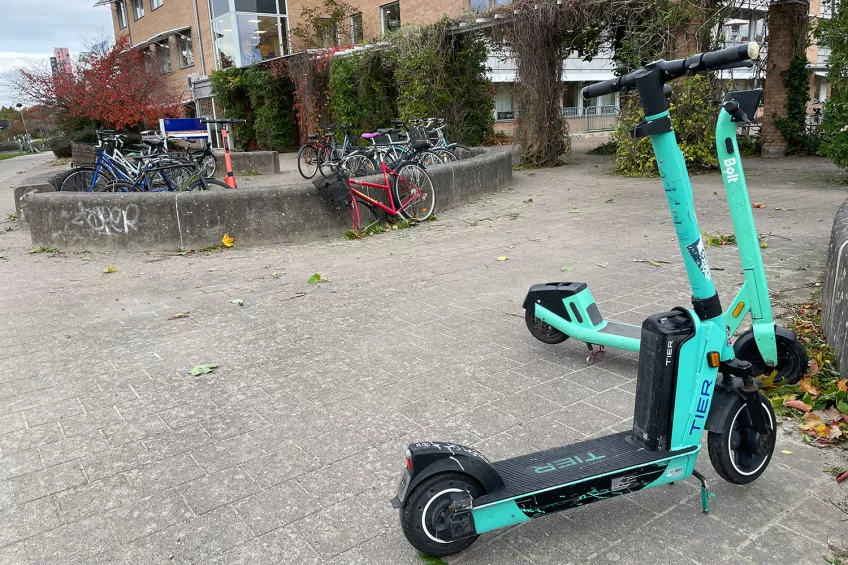“Users of e-scooters often start off as renting e-scooters for fun, but when they become regular users, they start taking the scooters for functional trips, such as going to work or school or adding that extra kilometre to the commute with public transport,” says Phil Flores.
His research also suggests that those of us who embrace innovation and want to try new things are more likely to try new modes of transport. It is more likely that being both male and young increases the likelihood of using shared electric bikes and electric scooters.
“It is known from previous research that males are more open to trying new innovations and that they are risk takers. Younger people in general are more open to new ideas and they themselves innovate. But my research shows that the main reason they go by e-scooters isn’t because it is considered ‘green’, but because it is fun.”
Novel research area
Phil Flores first came across e-scooters while walking to his office here in Lund a couple of years ago.
“What is this? I thought. I got curious and started googling and discovered that at that point there wasn’t any actual academic research on e-scooters. So, from then on, I knew what to write my thesis about,” says Phil Flores, now a newly appointed doctor in business administration at Lund University School of Economics and Management.
Do you use e-scooters yourself?
“I still haven’t tried them”, he says and laughs. “I feel a bit shy to admit that I haven’t used e-scooters myself, but there is a very good reason for it. I do prefer walking and taking public transport. I don’t drive or go by regular bicycle either. I don’t like manoeuvring vehicles, especially among other people.”
In his thesis, Phil Flores shows – among many things – that he is in fact not alone in not having tried out the e-scooters. His research is based on two large surveys, one made in 2020 with 1501 participants from Sweden and Denmark, and one made in 2022 with 1378 Swedes participating. Most participants were from big cities. A majority responded that they do not use electric scooters. In 2020, 39 per cent were users, while in 2022 only 17.6 per cent were. Phil Flores explains that the difference is probably due to the fact that more young people responded to the survey in 2020.
“I hope that my research can contribute to the discussion on how micromobility can be integrated in public transport. What if it can become so integrated that you won’t even notice when you shift from private to public transport? But for that change to happen e-scooters need to be more socially accepted. The problem might not be the vehicle, but those who use it.”
From no regulations, to many
In many cities around the world, the emergence of shared e-scooters has indeed been a mixed blessing.
“In Paris, shared e-scooters are banned nowadays, in Copenhagen they cannot be parked or rented in the city centre. In Norway, there are also several limitations and you’re not allowed to ride rented e-scooters while intoxicated. These are the consequences of the e-scooters not being regulated at all when they emerged, and of course, there have been a lot of accidents. In Sweden, there is at least a good bicycle network, whereas in other cities there aren’t.”
In his research, Phil Flores shows that only about ten per cent of the trips with shared e-scooters are substituting cars, even though the scooters are often marketed as “green”.
“Ten per cent is not much, but it is still there. Studies from the U.S. show that when you take away shared micromobility, people go by car instead.”
Phil Flores argues that there might be a “possibility for e-scooter travelling to become green”, especially if people could use them for short rides instead of taking the car.
“If shared e-scooters and e-bikes from private firms can be integrated into the public transport system, I think we would have a winning concept. It needs to be seamless, easy and convenient for the user,” he says.
A key point that is often overlooked is the possibility for micromobility – such as e-scooters and e-bikes – to “cover up the gaps” in the transport system.
“There’s the issue of social sustainability – places where many young people live, and where public transport is limited. For areas where people don’t have cars, and where public transport is lacking, this kind of novel, shared transport can give young people better access to leisure. Perhaps it’s even possible to introduce shared micromobility with good cycling infrastructure, instead of spending money on more buses.”
The image of the self is important
Do you think shared e-scooters are here to stay?
“Yes, based on the huge amounts of investments that are put into them and the growth of the market. There is a demand and I’m optimistic that once people become regular users, they will use the scooters for functional trips, such as commuting to work or school. Micromobility is here to stay, but who knows: if stricter regulations are implemented, people might avoid them. It still has to have an element of fun, even though it might mostly be functional.”
In Phil Flores' reasoning, and also in accordance with research, we humans act accordingly on how we perceive ourselves.
“If I see myself as rational and efficient with green values, then I act in that way. If I then consider for example e-scooters to be green and thus aligned with my values, I might become a user. But perhaps I don’t see them as green at all, as ‘not really me’ and then I won’t use them.”

